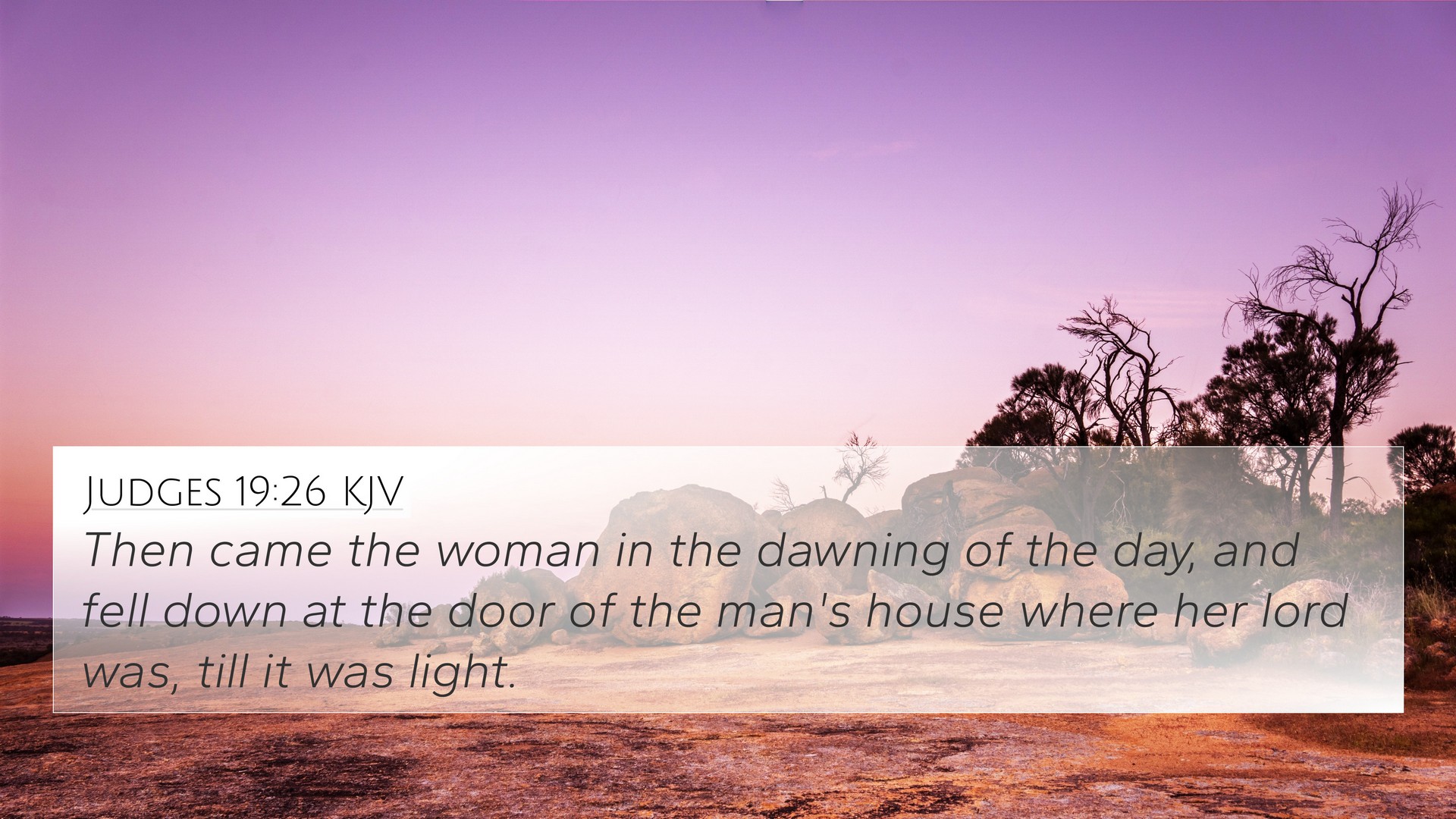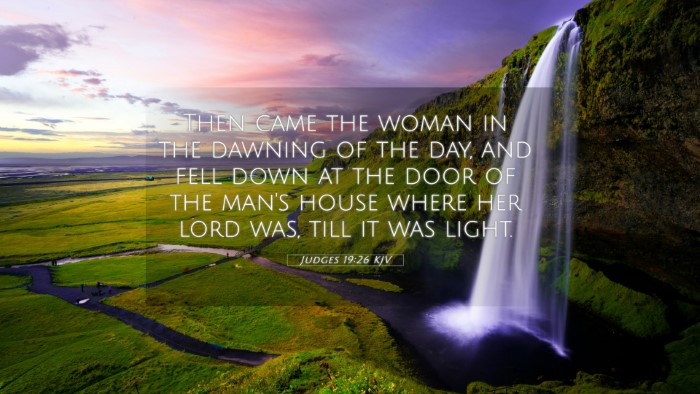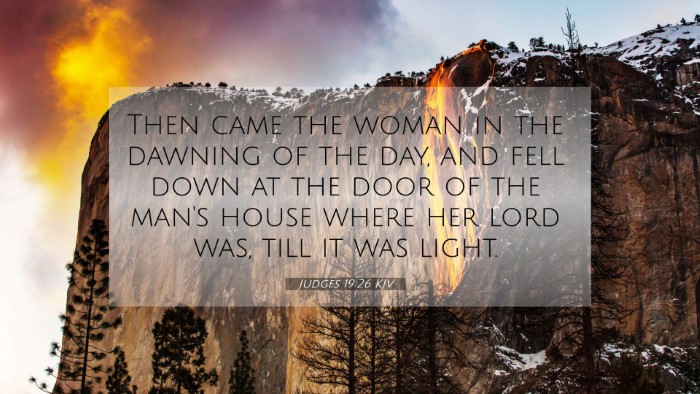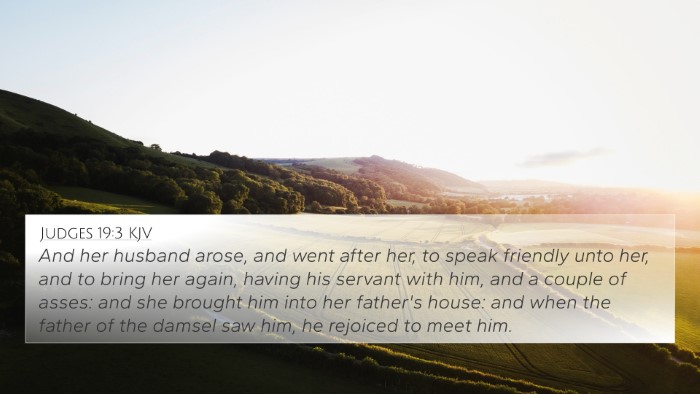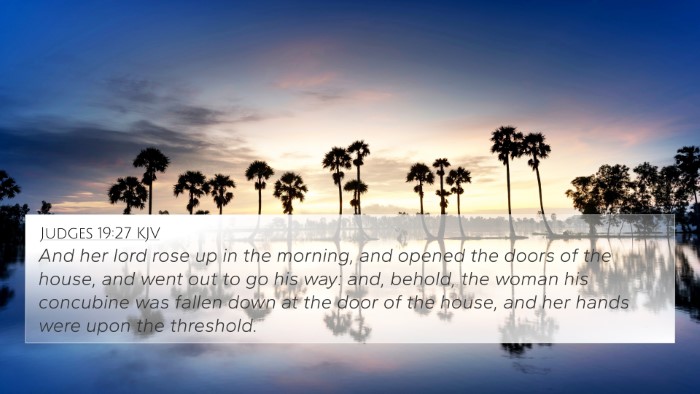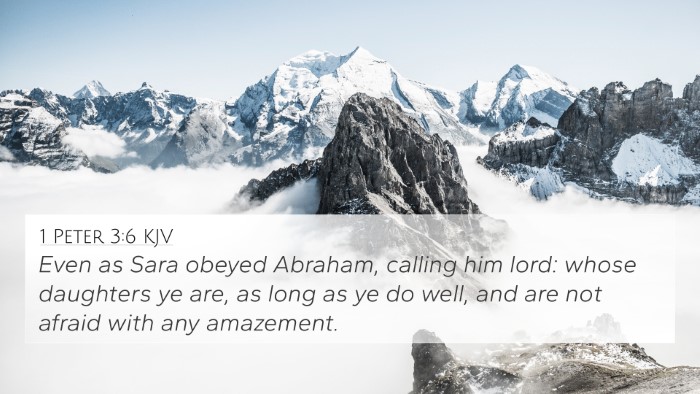Understanding Judges 19:26
The verse Judges 19:26 depicts a deeply troubling and complex event during the time of the Judges in Israel. It describes the harrowing moments following a violent episode in which a woman sacrifices her dignity and life for the safety of her husband, illustrating the depths of despair and moral decay prevalent in society during this period.
Summary of Judges 19:26
In this verse, the Levite's concubine comes to the door of an inn in the early morning, signaling a moment filled with desperation and tragic consequence. The narrative reflects the broader themes of betrayal, violence, and the consequences of societal neglect.
Insights from Public Domain Commentaries
- Matthew Henry: Henry emphasizes the lawlessness of Israel at the time, where personal honor and societal obligations have broken down. He notes that the act of sending the concubine out was a stark representation of the moral dilemmas faced by individuals in a corrupted society.
- Albert Barnes: Barnes provides insights into the cultural practices of hospitality during that era, discussing how the Levite’s actions reflect a distorted sense of honor. He argues that this tragedy also highlights how the consequences of individual sin affect not only the sinner but also those around them.
- Adam Clarke: Clarke delves into the character of the Levite, pointing out that the narrative serves as a cautionary tale. He posits that the Levite's failure to protect his concubine mirrors a larger failure to stand firm for justice within a corrupt society, illustrating the spiritual decay that led to such outcomes.
Bible Verse Cross-References
- Judges 19:25: This verse directly precedes and sets the stage for the events that follow, illustrating the violent behavior prevalent among the people.
- Judges 20:1-7: The repercussions of the events in Judges 19 are evident in the subsequent call to arms, revealing the national ramifications of individual sins.
- Matthew 5:28: This New Testament verse provides moral teachings that echo the ethical dilemmas presented in Judges, emphasizing the seriousness of lust and violation.
- Proverbs 14:12: This verse warns of the way that seems right to a man, paralleling the misguided decisions made by the Levite throughout the narrative.
- Galatians 6:7-8: These verses about reaping what one sows reflect the inevitable consequences that follow the actions of the characters in Judges.
- 1 Peter 3:7: This verse addresses the need for understanding and honor in relationships, offering a contrast to the dishonor seen in Judges 19.
- Isaiah 5:20: This warning about calling good evil and evil good resonates with the moral confusion depicted in the narrative of Judges.
- Romans 12:2: Paul cautions against conforming to the patterns of this world, which connects to the Israelites' failure to uphold divine standards as seen in Judges 19.
Connections between Bible Verses
Judges 19:26 can be examined alongside other verses to highlight thematic connections, showcasing the inter-Biblical dialogues around morality, justice, and the consequences of failing societal standards.
Identifying Patterns and Themes
The narrative of Judges often highlights several recurring themes:
- The Failure of Leadership: The lack of righteous leaders during this period leads to chaos. This theme resonates with Leaders of Israel, such as described in Samuel and Kings.
- Moral and Ethical Decay: The actions of individuals in Judges reflect a society spiraling into moral degradation, paralleling warnings found in prophetic books like Isaiah and Jeremiah.
- Consequences of Sin: Each act of disobedience leads to specific consequences, echoing the wisdom literature's warnings about reaping what is sown.
- Divine Silence: The absence of God’s direct intervention in the lives of the Israelites in these narratives raises questions about divine justice and the state of the people.
Comparative Bible Verse Analysis
When performing a comparative study, one can look at how Judges 19:26 aligns or contrasts with similar events or moral teachings in other parts of Scripture:
- In contrast to the faithful actions of Ruth, who represents loyalty and kindness, the actions surrounding Judges 19 depict betrayal and violence.
- The story of Sodom and Gomorrah (Genesis 19) serves as a historical parallel, showcasing similarly dire situations involving the treatment of individuals.
- The Gospels' teachings on neighborly love (Matthew 22:39) underscore the failures in interpersonal relationships evident in Judges.
Tools for Bible Cross-Referencing
To delve deeper into the connections between Scriptures, one can utilize various tools, including:
- Bible concordances
- Cross-reference Bible study guides
- Online and print resources for comprehensive cross-references
- Apps and software dedicated to Bible study and cross-referencing
Conclusion
Judges 19:26 serves as a poignant reminder of the consequences of societal breakdown and individual failures within a covenant community. Through careful cross-referencing and thematic analysis, readers can gain a deeper understanding of how this narrative reflects not only on individual moral decisions but also on larger societal implications—both in the time of the Judges and in our contemporary context.
Further Reflection
Consider reflecting on how the lessons from this verse apply today. How do we navigate moral dilemmas in our lives? What responsibilities do we hold for one another in our communities? Engaging with the Scripture allows for personal growth and a more profound understanding of God’s intentions for humanity.
